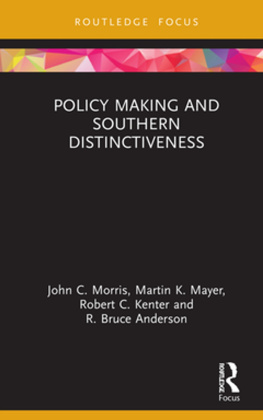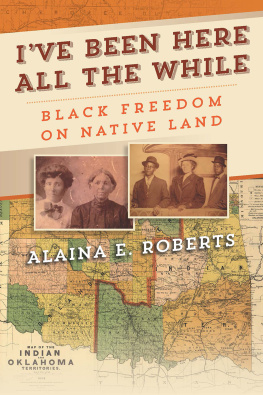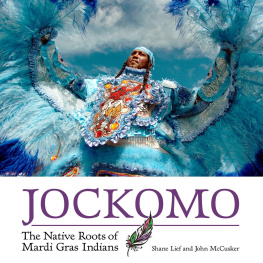Red StatesSERIES EDITORS
Jon Smith, Simon Fraser University
Rich Richardson, Cornell University
ADVISORY BOARD
Houston A. Baker Jr., Vanderbilt University
Leigh Anne Duck, The University of Mississippi
Jennifer Greeson, The University of Virginia
Trudier Harris, The University of Alabama
John T. Matthews, Boston University
Tara McPherson, The University of Southern California
Claudia Milian, Duke University
appeared, in somewhat different form, as Land! Hold on! Just hold on!: Flood Waters, Hard Times, and Sacred Land in Old Man and My Louisiana Love in Faulkner and the Native South, edited by Jay Watson and Annette Trefzer (Jackson: University Press of Missisippi, 2018).
2018 by the University of Georgia Press
Athens, Georgia 30602
www.ugapress.org
All rights reserved
Set in 10/13 Kepler Std by Graphic Composition, Inc., Bogart, Georgia.
Most University of Georgia Press titles are available from popular e-book vendors.
Printed digitally
Library of Congress Control Number: 2018003974
ISBN: 9780820353357 (hardcover: alk. paper)
ISBN: 9780820353340 (ebook)
ACKNOWLEDGMENTS
It seems nearly impossible to thank everyone who has contributed to my writing of this book. All of the best parts of this monograph are owed to the following institutions and people; the shortcomings of this project are mine alone.
First and foremost, I am eternally grateful for the support of my dissertation committee, Mark Jerng, Michael Wilson, and Julia Coates, as well as the intellectual support I received from the Departments of English and Native American Studies at UC Davis and the Department of English at the University of WisconsinMilwaukee. Mark Jerng continues to be a perfect mentor long beyond his duties as the director of my dissertation. Michael Wilson has proven unfailing in his support over the past sixteen years, and I cannot imagine my scholarly life without his steadfast advice. Julia Coates remains a source of constant encouragement, and much of this project emerges from our conversations about the U.S. South. My intellectual life has also been shaped by the undergraduate education I received from Auburn University: Paula Backscheider and Hilary Wyss taught me to love the earliest of archives, and Jim McKelly convinced me that I might have a future as an English major. Additionally, several members of the UC Davis community nurtured the development of the dissertation project that would become this book: Hsuan Hsu, Michael Ziser, Martha Macri, and Judy Alexander offered their feedback, support, and enthusiasm as I imagined what this work could become. This project also owes much of its early conception to conversations with Jack D. Forbes, and one of the treasures of my life is having had the opportunity to talk to him about these ideas before he passed on.
The Department of English at Georgia State University has offered me invaluable support over the last six years. I am especially grateful for the wonderful GSU graduate students and undergraduates who have shared their contagious enthusiasm for literature and history. In particular, David Gomez and the New Echota students have always challenged my thinking about what Native American history and literature means to the contemporary U.S. South; the best part of my job has been working with David and these students to improve the way Georgia accounts for its Removal legacy. Likewise, the Native undergraduate students I have had the pleasure to teach, including Molly Bowman, Olivia Cambern, Jessica Parker, and Lindsey Smith, are leading the way at GSU and in Atlanta for creating a better future for Indigenous peoples in the U.S. South. They leave me humbled and inspired to undertake this work. My department chairs, Randy Malamud and Lyne Gaillet, have supported my research. Harper Strom has consistently been the person there for me to help solve any crisis. My faculty mentor Matthew Roudan is possibly the worlds most wonderful colleague. I am proud to consider him a friend. Fellow junior faculty members Emily Bloom and Ashley Holmes offered immensely helpful advice on the initial proposal for this book, and I am especially indebted to Emily for encouraging me to just go ahead and call the book Red States even though I was hesitant to own such a potentially provocative title. Likewise, Lindsey Eckert has listened to so many iterations, stops, and starts of this books evolution that I am grateful that she still allows me to come into her office. Without a doubt, Scott Heath has been my closest intellectual companion over the last five years. If not for his generous ears and mind, this book would not exist.
Additionally, this book would not be possible without the material and financial support from several key institutions and individuals. I thank the American Antiquarian Society, the Davis Humanities Institute, the Southern Historical Collection at UNCChapel Hill, and the Georgia State University Research Initiation Grant for their generous support of my work. Likewise, two summer programs sponsored by the National Endowment for the Humanities allowed me to hone my ideas. Scott Manning Stevens of the DArcy McNickle Center at the Newberry Library offered early feedback during his 2010 Institute. Theda Perdue, Malinda Maynor Lowery, Clara Sue Kidwell, and Michael Green of the University of North Carolinas American Indian Center helped me refine my argument during their 2011 Seminar, and Malinda Maynor Lowery offered invaluable feedback about portions of the book in its final stage. This project also benefited from conversations at the 2010 Clinton Institute for American Studies Summer School at University College Dublin. Special thanks to Ashley Cataldo, Laura Clark Brown, Lara Cohen, Paul Erickson, Jack Larkin, Jaclyn Penny, and Laura E. Wasowicz for their archival guidance during my time at the American Antiquarian Society. I also wish to thank the reviewers and editors from the University of Georgia Press. Walter Biggins, Jon Smith, Rich Richardson, and Eric Gary Anderson as well as the anonymous readers of the manuscript have all worked to make this book so much better than my brain alone could have achieved. In addition to the libraries and research centers that have helped make this book possible, I also owe an enormous debt of gratitude to those who took the time to talk with me about their work: Lauren Adams, Margaret Bauer, Jim Clark, Brian Clowdus, Dacia Dick, Clyde Ellis, Jeff and Shannon Hatley, Willie French Lowery, Malinda Maynor Lowery, Robert Richmond, Eddie Swimmer, and Leah Wilhelm all shaped my thinking about outdoor drama in the U.S. South. I would also like to thank the Paul Green Foundation and the Roanoke Island Historical Association for their continued support of my work. I am fortunate to be a member of two of the best scholarly communities in academia: Native American studies and southern studies. None of my work would be possible without the generosity and rigor of the scholars in these fields. In particular, Ben Frey, Todd Hagstette, Lisa Hinrichsen, Jeff Rogers, and Kirstin Squint have offered direction, clarification, resources, and encouragement for parts of this research.







